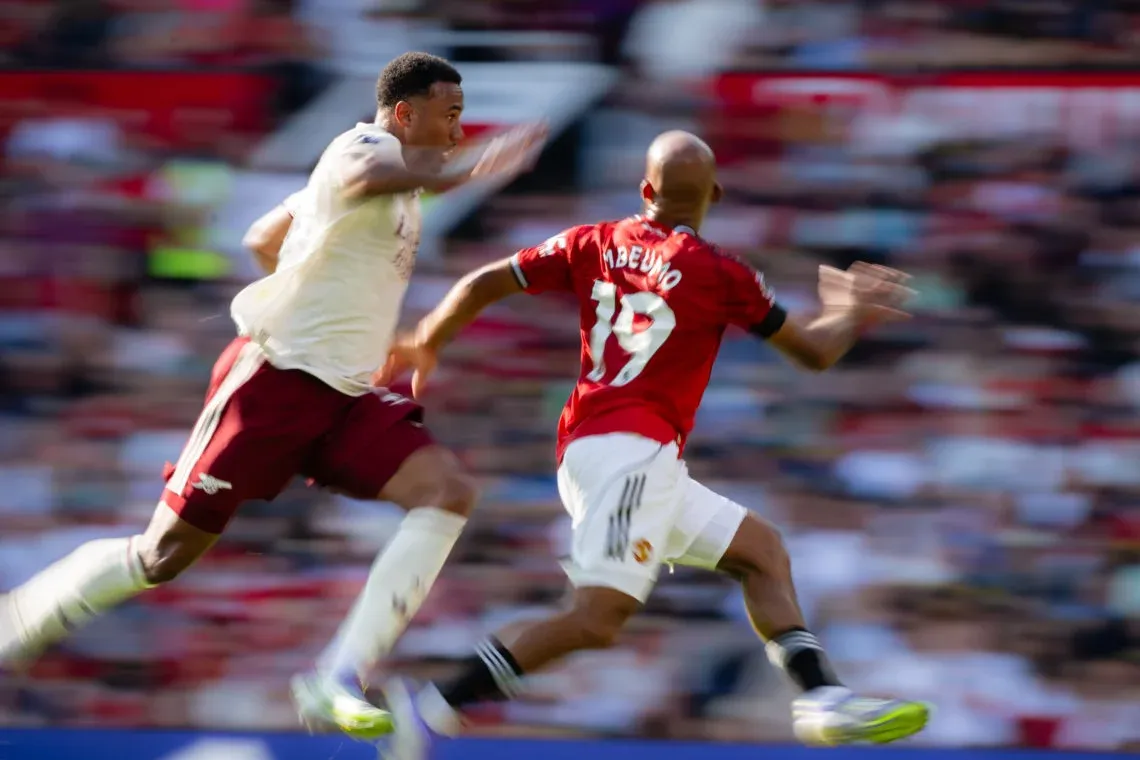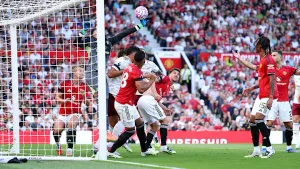Manchester United kicked off their 2025/26 Premier League campaign with a 1-0 defeat to Arsenal at Old Trafford.
But despite the loss, the match showcased significant positives under Ruben Amorim, with a tactical setup that highlighted a revitalized approach and promising performances from debutants Matheus Cunha and Bryan Mbeumo.
Tactical Setup: A Disciplined Low Block with Attacking Intent
Ruben Amorim stuck with his 3-4-2-1 formation set-up that has been heavily criticised, but he now has the new faces in the attack that he desperately needed.
Manchester United's approach to the game was a low block to neutralize Arsenal’s attacking prowess while seeking opportunities to exploit transitions. This setup marked a departure from the disjointed performances of recent seasons, showcasing a cohesive and disciplined structure.
The back three provided defensive solidity, allowing United to absorb Arsenal’s pressure, who dominated possession with 67% of the ball. De Ligt marshalled Arsenal's new striker Viktor Gyokeres, who did not have a single shot all game.
The midfield duo of Bruno Fernandes and Casemiro acted as a pivot, maintaining compactness, while the front three—featuring Cunha, Mbeumo, and Mount, aimed to stretch Arsenal’s defense on the counter.

Amorim’s strategy focused on direct play, with an emphasis on quick transitions and utilizing the pace and flair of the wide players. The low block frustrated Arsenal’s 4-3-3, forcing them into less dangerous areas and limiting their shot quality.
Arsenal managed only four shots after their early goal, with zero on target in the second half, underscoring United’s defensive resilience. The tactical setup allowed United to press high at key moments, particularly in the second half, where they pinned Arsenal back and created sustained pressure.
Positives from the Performance
Despite the narrow defeat, several aspects of Manchester United’s display offered encouragement for the season ahead:
Attacking Promise and Creativity:
United’s forward line, bolstered by new signings of Mbuemo and Cunha, showed significant potential. The team created several goal-scoring opportunities, with 22 attempted shots at goal and better xG than Arsenal, indicating a much improved attacking threat.
Patrick Dorgu rattled the post with a long-range effort, Cunha had several good efforts and the team’s persistence in the second half forced Arsenal’s goalkeeper David Raya into multiple saves. The attacking trio’s interplay and directness, caused Arsenal’s defense issues all game.
We take the positives and move on.
— Manchester United (@ManUtd) August 17, 2025
That's the message from our skipper, @B_Fernandes8 ©️
Resilience and Second-Half Dominance:
United’s second-half performance was particularly encouraging. They pinned Arsenal back for extended periods, generating multiple shots and a clear chance for Mbuemo's header, which was excellently saved by Raya. The team’s ability to maintain pressure and probe for an equalizer, despite trailing, highlighted a newfound resilience and belief, contrasting with the fragility seen in previous campaigns.
Cohesive Team Play and Improved Structure:
Unlike previous seasons, United actually looked like a unified team under Amorim. The 3-4-2-1 / 3-4-3 formation provided a clear identity, with players executing their roles effectively. The direct play and fluid movement between the lines were evident, as United transitioned quickly from defense to attack. This was a marked improvement from the often chaotic performances of the past, signaling a promising foundation for Amorim’s project.
Impact of Matheus Cunha and Bryan Mbeumo
The debuts of Matheus Cunha and Bryan Mbeumo were standout features of the match, with both players making significant contributions that underscored their potential to transform United’s attack.
Bryan Mbeumo: The former Brentford winger quickly became a fan favorite with his direct and menacing play. Amorim’s game plan leaned heavily on Mbeumo’s pace and dribbling, with United frequently targeting him with early balls to exploit Arsenal’s high line. His header in the second half was United’s clearest chance, denied only by an outstanding save from Raya. Mbeumo’s ability to cut inside and combine with teammates like Cunha added a new dimension to United’s wide play. His debut showcased his potential to be a consistent goal-scoring threat.
Matheus Cunha and Bryan Mbeumo alone fired NINE shots at Arsenal - the same as the entire Gunners squad managed at the other end 😮💨 pic.twitter.com/xYcJwhw3IQ
— OneFootball (@OneFootball) August 17, 2025
Matheus Cunha: Signed from Wolverhampton Wanderers, Cunha was arguably the best player on the pitch. Deployed in a slightly deeper role, he showcased his versatility as a playmaker and goal threat. His work rate and ability to link play were pivotal in United’s attacking transitions. Cunha fired multiple shots, testing Arsenal’s David Raya, who made a crucial low save to deny him. His movement between the lines created space for teammates, and his energy drove United’s second-half surge. Cunha’s performance suggested he could thrive supporting a focal point like Sesko. His dynamism and relentless pressing embodied Amorim’s vision for a high-intensity attack.
Both players’ debuts were marked by their ability to adapt to Amorim’s system and challenge Arsenal’s defense. Their interplay with debutant Benjamin Sesko, who played the final 30 minutes, hinted at a potent attacking trio in the making. While the trio’s chemistry is still developing, their performance offered a glimpse of a dynamic, cohesive unit that could gel over time.
Challenges and Areas for Improvement
The defeat was ultimately decided by a set-piece error from goalkeeper Altay Bayindir, who flapped at a Declan Rice corner, allowing Riccardo Calafiori to score in the 13th minute.
Ruben Amorim snapped in his post-match press conference regarding a question about the selection of Bayindir over Tom Heaton, but ultimately, it was Bayinder's mistake that cost him during the game. Andre Onana is reportedly back fit since his hamstring injury, but Amorim opted to select Bayindir as a result of him completing the entire pre-season. Amorim will need a reliable number one to back up Manchester United's defensive stability.
Additionally, while United created lots of attacking chances, they still lacked that final clinical edge in front of goal, which highlighted the need for Sesko to start firing as their new number 9. His amount of goal contributions, along with support from Mbuemo and Cunha throughout the season, are going to be essential if Manchester United are to get back to competing for the Champions League qualification places and beyond once again.


